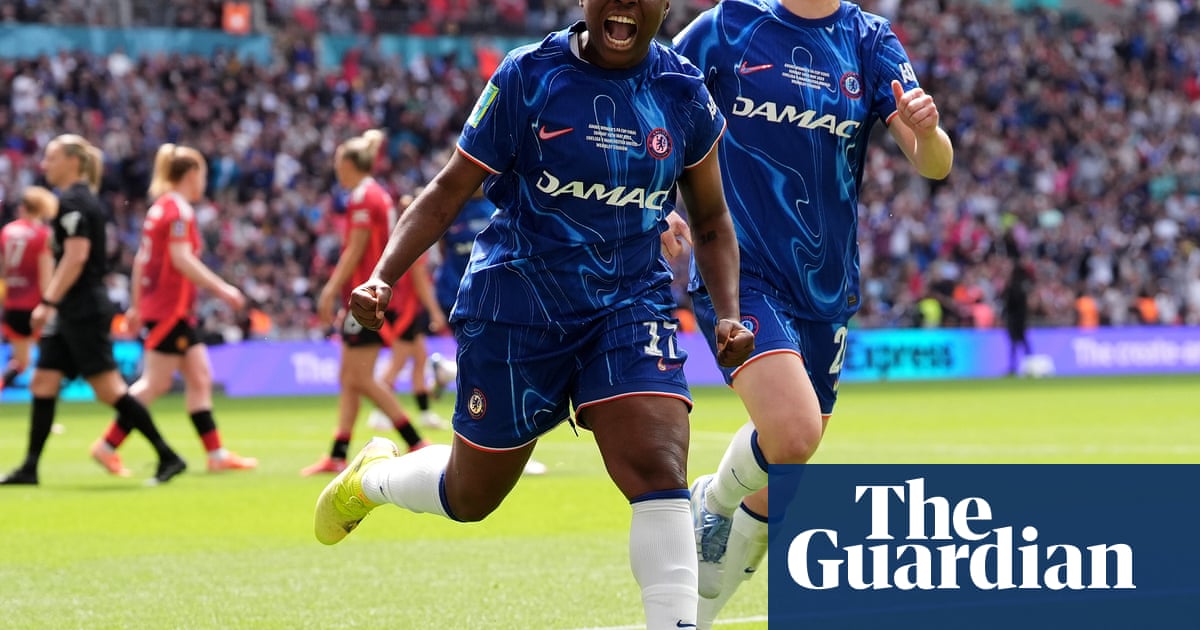Unflustered, unrivalled and unbeaten. Sonia Bompastor’s Chelsea team were at their clinical best as they completed a 30-game unbeaten domestic treble with a 3-0 win against Manchester United in the FA Cup final.
For the most part, United weren’t that bad, Chelsea were just better when it mattered most, again and again and again, two goals from Sandy Baltimore, arguably the Blues’ player of the season, sandwiching Catarina Macario’s headed effort.
There were high expectations for the first sold-out Wembley Women’s FA Cup final on the 10th anniversary of the first one held at the national stadium. The fact that only 74,412 filed into the ground will be a small talking point, ticket prices not yet high enough for fans to prioritise it, and women’s team fanbases not quite large enough for the Football Association to be able to stop selling tickets far in advance of the teams in the final being confirmed, but these are changes that are creeping closer.
Ella Toone was a surprise omission from the United starting XI, a day after she was named the club’s player of the season for a second consecutive year. Wembley has been a fertile hunting ground for the midfielder, who scored the opening goal inthe Euro 2022 final, England’s first in the 2023 Finalissima and United’s first in their4-0 rout of Tottenhamin the FA Cup final last year, all at Wembley. Instead, Dominique Janssen joined Hinata Miyazawa and Grace Clinton in midfield, while Aoife Mannion slotted in at the back in the absence of injured Jayde Riviere.
It was a rampant start for the visiting team, who had Avram Glazer and the chief executive, Omar Berrada, in attendance but not the minority owner Sir Jim Ratcliffe, who also missed the final last year. The Blues struggled to escape their own half under the relentless early pressing of Skinner’s side but they weathered it well, the new-look back three made up of Nathalie Björn, Millie Bright and Naomi Girma holding up.
The first big chance of the half fell to Bompastor’s charges after they started to assert themselves in possession, Aggie Beever-Jones escaping on the right, her shot stopped by a recovering Millie Turner, whose leg nicked the edge off it and Phallon Tullis-Joyce made the save.
Three minutes later, United had their clearest opportunity, Elisabeth Terland, returned to the starting XI in place of Melvine Malard, swung the ball in from the right and Björn cleared but only as far as Janssen who powered her effort over the bar from the edge of the box.
With the match end to end – fittingly, with the tennis legend Serena Williams in the stands alongside her daughter, Olympia, and husband, Alexis Ohanian, Chelsea’s new minority owner – it was Chelsea who would go closest next. Mayra Ramírez, deemed fit to start the game after a spell out through injury, wove her way past Mannion before poking a pass through towards Lucy Bronze, who was being closely shadowed by Leah Galton, Tullis-Joyce pushed clear and Gabby George was on hand to fire the loose ball away from the back post.
It was Chelsea that drew first blood and the circumstances were frustrating for the holders. Celin Bizet, who was on the opposing team in the final last year, somewhat inexplicably threw her leg across the body of Erin Cuthbert just inside the box and the penalty call was instant. Up stepped Baltimore and, despite Tullis-Joyce’s stare-off and delaying tactics, she powered the ball into a bottom corner, sending the keeper the wrong way. It was a crushing blow for United coming just before the break.
Sign up toMoving the Goalposts
No topic is too small or too big for us to cover as we deliver a twice-weekly roundup of the wonderful world of women’s football
after newsletter promotion
Despite their dominance there have been times this season when Chelsea have failed to thrill and this was far from their fluid best. It was a reflection of their season and success. No matter the opposition or intensity, no matter the disruption to their own rhythm, they are an unflusterable and dogged beast. If plan A doesn’t work, they have a B, C and D. They are winners and they know how to manage an array of game scenarios.
At half-time Toone was finally on, replacing Turner, who had picked up a knock in the first half, with Janssen dropping back. Again, the Reds burst out of the blocks, the half-time message surely to channel their early intensity. Terland soon glanced a header wide, while Toone’s half-volley was straightforward for Hannah Hampton. After that, they struggled to create clearcut chances and really test the Chelsea back three.
Chelsea delivered the killer blow with six minutes remaining, Baltimore’s free-kick whipped in from the right and powerfully turned in by the head of Macario, on as a substitute, who had snuck in front of Maya Le Tissier.
The cherry on top came from Baltimore, who received the ball from Wieke Kaptein after some sloppy United defending and spun before striking past Tullis-Joyce with a ferociousness fitting of a final.
